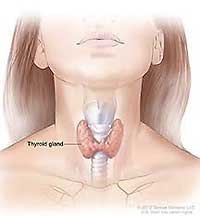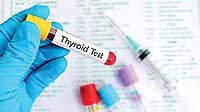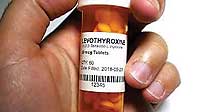|
|
HEALTHY HAPPENING July 2019
|
Could it be your thyroid?
Ray Andrew, MD
|
 There is a meme circulating of a plaque on a doctor's wall saying: "Please don't confuse your Google search with my Medical Degree." It is true that we can learn just enough to be hazardous to our health using the internet. At the same time, the internet has enabled an ever-enlarging segment of our population to obtain answers their doctors aren't equipped to give them. There is a meme circulating of a plaque on a doctor's wall saying: "Please don't confuse your Google search with my Medical Degree." It is true that we can learn just enough to be hazardous to our health using the internet. At the same time, the internet has enabled an ever-enlarging segment of our population to obtain answers their doctors aren't equipped to give them.
Trained in all the latest drugs, doctors are unfortunately short-changed in medical school when it comes to understanding the numerous effects and complex interrelationships between hormones. So it does not surprise us when yet another patient presents to us at Prestige Wellness Institute complaining of symptoms like fatigue, depression, irritability, hair loss, constipation, cold temperature, weight gain, not feeling rested after a good night's sleep, irregular periods, and foggy thinking, only to inform us that her primary care doctor told her that her thyroid is normal. Her body is telling her that her thyroid is in the tank while a blood test says it’s normal. How can this be?
There are actually a number of reasons for this:
1. Doctors are taught to check a test called TSH. This is a hormone made in the brain. It is the signal the brain sends to the thyroid gland to tell it how much thyroid hormones to release into the bloodstream. The higher the TSH, the more the brain is telling the thyroid, "Give me more!" If the thyroid fails to release enough hormones, TSH will remain high. If you also have some of the symptoms I mentioned above, then we diagnose hypothyroidism. Alternatively, if TSH is naturally low, the brain is saying, "Back off! I have too much" thyroid hormones. But how does the brain know if there are too few or too many thyroid hormones floating around? It has sensors called "receptors". Unfortunately, the receptors in the brain are not the same receptors that are in the rest of the body. As a result, the receptors in the brain can think there are enough thyroid hormones while the rest of the body is suffering.
2. To get a more complete picture of thyroid function, we need to know not just TSH, but also total and free T4, free T3, and thyroglobulin. And we need to recognize that they don't always agree. One level could suggest too much thyroid hormones while another suggests just enough and the third, too little. In this case, more information is needed in order to understand what is really going on. However, testing only one of those levels could fool a doctor into thinking you have too little or too much when exactly the opposite may be the case.
3. Normal lab ranges change over time. Simply looking at the lower number and the higher number on the lab report misleads most doctors. This is because many laboratory reference ranges are based on population averages rather than studies of people in optimal health. These days, fewer and fewer people qualify as being in optimal health, so looking at average hormone levels is not a useful guideline. Moreover, what is optimal for one person won't always be optimal for another. We all recognize that there is a wide variety of shoe sizes worn by American adults, so it shouldn’t surprise us that we are different in other ways as well. My size 10 1/2 shoe is normal for me but it might either drown your foot, or scrunch it. It's not the size of the shoe that is important. Rather, it's how comfortably that shoe fits and how well it enables you to walk, run, jump, hike, and climb on a variety of surfaces without injuring your foot. Hormones often work the same way. Although we use thyroid hormone levels as guidelines, it's not the amount of hormones that counts, but rather the effects they have on all the cells in your body.
4. Lab tests give clues. They guide additional evaluation. They don't tell the full story any more than a single bystander on a street corner knows exactly what caused a car accident. This is why any meaningful evaluation of thyroid function relies on views from multiple vantage points, just like reports from multiple witnesses are relied upon to determine the cause of a crash at an intersection.
5. No evaluation of the thyroid is complete without testing antibodies. A person with completely normal thyroid hormone levels can have all the symptoms of hypothyroidism due to an autoimmune disease called Hashimoto's thyroiditis. Studies have demonstrated that thyroid antibodies can be present for up to 15 years before thyroid hormone production begins to fall. Yet the affected person can already feel hypothyroid.
6. The thyroid affects and is affected by every other part of the body. Not uncommonly, a person with perfectly normal thyroid function will experience the effects of thyroid deficiency because the body is unable to respond adequately to thyroid hormones without sufficient cortisol. This problem cannot be ruled out with a simple blood test. Not only does getting one's blood drawn change her cortisol output, but normal cortisol production varies throughout the day. So it could be normal at the time her blood is drawn but abnormal at other times of the day.
7. A variety of conditions cause the body to produce too much of a hormone called Reverse T3 (RT3). RT3 is a mirror image of T3, so it attaches to the T3 receptors in cells throughout the body. Unfortunately, unlike T3, RT3 does not stimulate the cells to action. Worse, by attaching to T3 receptors, RT3 actually blocks T3 from attaching to them. As a result, you can have more than enough T3 floating around in your bloodstream, but your cells can’t use it. You are functionally hypothyroid and will experience the symptoms and long-term ill health consequences of full-blown hypothyroidism.
These are the 7 most common reasons men and women come to us complaining of hypothyroid symptoms in spite of having been told their thyroid is normal. But what if you are already being treated for hypothyroidism and don’t feel any different? You're not alone. We see this every day in our offices. 
In medical school, we are taught to prescribe a drug called levothyroxine for hypothyroidism. The most common brand name is Synthroid. This is the laboratory equivalent of T4, one of five hormones made by the thyroid. For some people with thyroid deficiency, this is all they need because their cells can convert T4 into the active thyroid hormone, T3 (the one that actually does the work of metabolism).
For a variety of reasons, however, increasing numbers of people don't make that conversion as effectively as they used to. As a result, they can have plenty of T4 floating around, and their brain can think they have enough or even too much, when in reality cells throughout the body can't use it because they can't turn it into T3. If this or any of the other scenarios described above sounds like it could be your problem, a good hormone specialist can help you sort things out.
In conclusion, if your body tells you that you don't have enough thyroid hormones but one or more lab tests say you do, spare yourself the Google search. Find a specialist in functional medicine. We have advanced training in hormone evaluation and management. Prestige Wellness Institute, in Moab and Springville, serves the hormone needs of patients from all over Utah and six surrounding states. Just as important as how you feel, getting the help you need from a specialist in hormones can mean the difference in how healthy you are, and how long you live.
|
Sore No More and the Unexpected |
 After 15 years of research, including trial-and-error with various athletic groups, we released Sore No More as an all natural solution to athletic associated pains in 2001. As being a medically used product, we also invested in FDA approved manufacturing and regulated status. After 15 years of research, including trial-and-error with various athletic groups, we released Sore No More as an all natural solution to athletic associated pains in 2001. As being a medically used product, we also invested in FDA approved manufacturing and regulated status.
We are honored to be recognized around the world as a non-drug solution for the athletes! In fact, so many Olympians during the winter games in Vancouver were using Sore No More; that we had to have our product tested independently for the Olympic Committee! And today, several record breaking individuals promote Sore No More to their teammates.
 Due to this word of mouth energy, various unexpected things have happened! For example, some veterinarians who work on race horses, discovered that putting Sore No More on the horse, who seem to be impaired with tinnitus, 30 minutes before racing, greatly improved the horse performance! Now vets buy Sore No More in large buckets across the country for horses! Due to this word of mouth energy, various unexpected things have happened! For example, some veterinarians who work on race horses, discovered that putting Sore No More on the horse, who seem to be impaired with tinnitus, 30 minutes before racing, greatly improved the horse performance! Now vets buy Sore No More in large buckets across the country for horses!
This usage by vets created a new market for Sore No More as well. A vet in Texas used the gel on a labrador suffering from arthritis. Guess what, the labrador also had a rare canine disease in which he suffered from excessive fleas and lice in which normal procedures would not help. He accidently found that the gel also kills fleas and lice. And as a result of various trials, we were able to get a head lice patent!
The United States Army was using Sore No More for pain control at the William Beaumont Hospital in El Paso, Texas for soldiers waiting for amputation due to neuropathy. Guess what! By accident we discovered that Sore No More is an effective treatment for neuropathy in many cases! And the soldiers no longer needed amputation!!
Looking for stress relief? Well guess what! A tablespoon of Sore No More in a jetted tub or regular tub (not hot tub) is your solution! Mix in a jar of warm water and shake until mixed, then put in a very warm bath … and relax! In Vegas, spas charge up to $100 an hour for their treated jetted tubs!
Because of many customers and their feedback experiences, we now expanded our suggested applications and patents; including cluster headaches, fibromyalgia control, skin fungus, sleep enhancement, and more which are currently being investigated. As you can see, customer feedback and experiences are very important to all of us.
So, may we request, that if you have comments on YOUR experiences, please let us know. The best contact point is at moabking@gmail.com. Thank you for your interest.
|
HEALTHY CLASSES
Tuesdays
Sheng Zhen Tuesdays with Lisa- two meditation forms from 1:-1:45 seated from a chair and a standing form taught from 2:00-3:00 pm at the Grand Center Vitality Room at 182 North 500 West. Contact certified teacher, Lisa DeRees 435-260-9678 for details. No class on July 16th.
Kundalini Yoga & Gong Meditation- 5:30pm at 125 E. 200 North, Historic Helen Taylor Home. Teacher: Gregory Lee Hood. By donation. For info: 713-817-7859.
Wednesdays
Yoga Basics- 11:30-12:45pm at Moab Recreation & Aquatic Center, 374 N Park Ave. Props available. Drop-in prices. Donation based for AARP Medicare Sup, SilverSneaker, Fit members. Questions? Contact Star Kolb mindivine@gmail.com 406-291-6408
Thursdays
All Levels Sheng Zhen Gong – every Thursday 5:30-7pm with certified teacher Don Leathers at the Moab Arts & Recreation, 111 E. 100 North. 435-259-8123.
Kundalini Yoga & Gong Meditation- 5:30pm at 125 E. 200 North, Historic Helen Taylor Home. Teacher: Gregory Lee Hood & Music Sound Therapist Annette Kearl, PhD. By donation. For info: 713-817-7859. No class July 4th.
Saturdays
10am Kundalini Yoga & Gong Meditation at 2950 Red Moon Lodge, Old City Park Road. Teacher: Gregory Lee Hood & Music Sound Therapist Annette Kearl, PhD. By donation. For info: 713-817-7859 |
|
| |
|
|
|
|
|
|
© 2002-2024 Moab Happenings. All rights
reserved.
Reproduction of information contained in this site is
expressly prohibited.
|
|